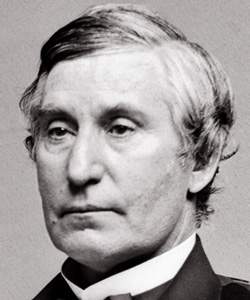Jacob Merritt Howard (Congressional Biographical Directory)
Reference
HOWARD, Jacob Merritt, a Representative and a Senator from Michigan; born in Shaftsbury, Bennington County, Vt., July 10, 1805; attended the district schools and the academies of Bennington and Brattleboro; graduated from Williams College, Williamstown, Mass., in 1830; studied law; moved to Detroit, Mich., in 1832; admitted to the bar in 1833 and commenced practice in Detroit; city attorney of Detroit in 1834; member, State house of representatives 1838; elected as a Whig to the Twenty-seventh Congress (March 4, 1841-March 3, 1843); was not a candidate for renomination in 1842; helped draw up the platform of the first Republican convention in 1854; attorney general of Michigan 1855-1861; elected as a Republican to the United States Senate to fill the vacancy caused by the death of Kinsley S. Bingham; reelected in 1865 and served from January 17, 1862, to March 3, 1871; chairman, Committee on Pacific Railroads (Thirty-eighth through Forty-first Congresses); died in Detroit, Mich., April 2, 1871; interment in Elmwood Cemetery.
“Howard, Jacob Merritt,” Biographical Directory of the United States Congress, 1774 to Present, http://bioguide.congress.gov/scripts/biodisplay.pl?index=h000839.
Jacob Merritt Howard (American National Biography)
Scholarship
In 1841 he was elected to Congress. Throughout his tenure as a congressman, Howard was an outspoken opponent of slavery. After completing his term, he returned to private practice in Michigan. In 1850, when arguing a fugitive slave case before the U.S. circuit court, he publicly denounced the Fugitive Slave Law and predicted that the country would eventually come to armed conflict over the issue of slavery.
In 1854 Howard joined the new Republican party. He was one of the leading members of the Jackson, Michigan, convention held on 6 July that organized the new party. As chair of the Committee on Resolutions, Howard drafted the party platform, which deplored slavery as a social evil and opposed its expansion into the territories. He was reputed to have given the new party its name.
In 1854 Howard joined the new Republican party. He was one of the leading members of the Jackson, Michigan, convention held on 6 July that organized the new party. As chair of the Committee on Resolutions, Howard drafted the party platform, which deplored slavery as a social evil and opposed its expansion into the territories. He was reputed to have given the new party its name.
Silvana Siddali, "Howard, Jacob Merritt," American National Biography Online, February 2000, http://www.anb.org/articles/04/04-00529.html.



